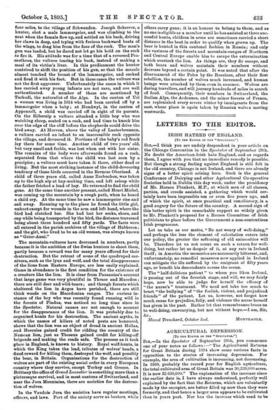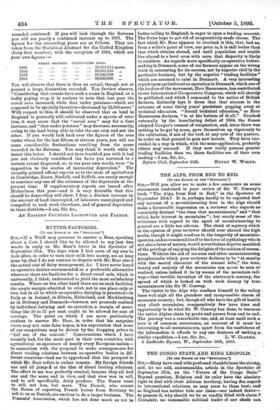AGRICULTURAL DEPRESSION.
[To THE EDITOR 01 THE "SPECTATOR."] SIR,—In the Spectator of September 28th, you commence
one of your notes as follows : The Agricultural Returns for Great Britain during 1894 show some curious facts in opposition to the stories of increasing depression. For example, the area of cultivation is increasing, not decreasing. In 1869, probably the record year for English agriculture, the total cultivated area of Great Britain was 30,339,000 acres. It is now 32,630,000." The explanation of the increase since the earlier date is, I have always understood, perfectly well explained by the fact that the Returns, which are voluntarily made by the occupier, are better filled up now than they were formerly, and that hence a larger area appears to be cultivated than in years past. Nor has the increase which used to be recorded continued. If you will look through the Returns you will see yearly a continued increase up to 1891. The figures for the succeeding years are as follows. They are taken from the Statistical Abstract for the United Kingdom (forty first number), with the exception of 1894, which are your own figures :
GREAT BRITAIN. CULTIVATED AREA.
1891
... 32,918,511 acres.
1892 .., 32,685,550 „ 1893 ... 32,643,709 „ 1894 ... 32,630,000 „
You will observe that there is thus an actual, though not at present a large, diminution recorded. You further observe, " Considering that cereals have such a name in England as a badly paying crop, it is curious to note that last year the cereal area increased, while that under potatoes—which are supposed to be specially lucrative—decreased by 23,000 acres." With respect to this, it should be observed that as land in England is generally still cultivated under a system of rota- tion, it may occur that the "cereal area" may for a time increase, and "that under potatoes" may decrease, necessarily, owing to the land being able to take the one crop and not the other. If you would look back over the figures of the area under wheat for the last fifteen or sixteen years, you will see some considerable fluctuations resulting from the cause recorded in the Returns. You may think it worth while to insert this letter. I should not have troubled you with it had you not obviously considered the facts you narrated to a certain extent disproved, or, to use your own words, were "in opposition to the stories of increasing depression." The recently printed official reports as to the state of agriculture in Cambridge, Essex, Norfolk, and Suffolk, are surely enough to convince any one of the existence of the depression at the present time. If supplementary reports are issued after Michaelmas this year—and it is very desirable that this should be done—they will show, I fear, a distinct increase in the amount of land unoccupied, of labourers unemployed and compelled to seek work elsewhere, and of general depression in these districts.—I am, Sir, &c.,
AN EASTERN COUNTIES LANDOWNER AND FARMER.







































 Previous page
Previous page